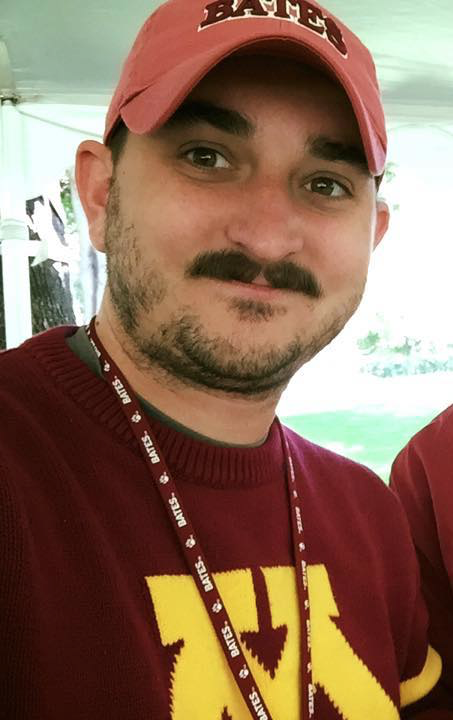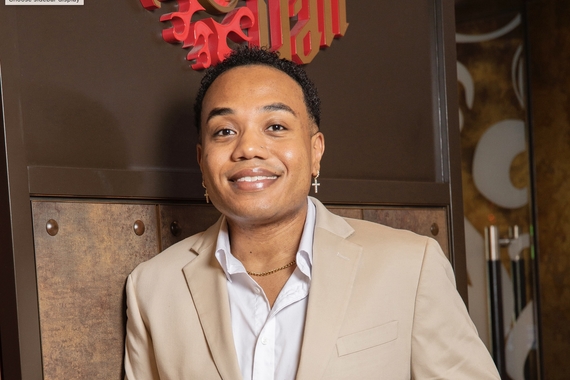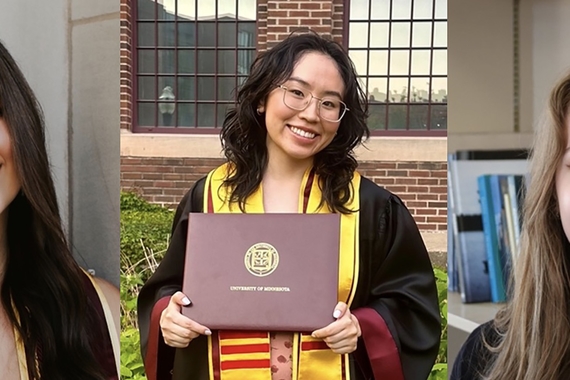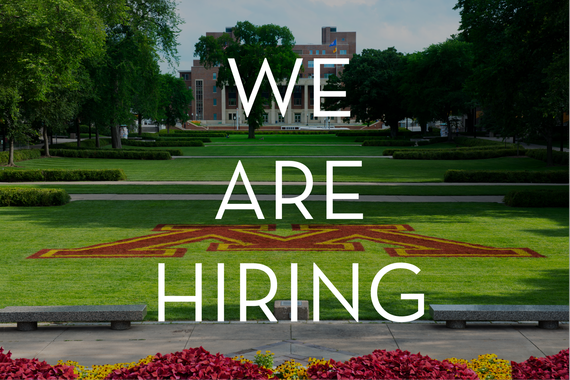Featured PhD Student: Alexander Champoux-Crowley

Where are you from?
I’m originally from southern Maine, down between Portland and Freeport.
Where did you previously attend school? What was your degree in?
I did my B.A. at Trinity College (Hartford, CT) in “English” (Creative Writing & Literature) with a minor in “Writing, Rhetoric, and the Media Arts,” but somehow managed to dodge taking any courses in Rhetoric during that degree. I got into Writing Center work at Trinity, though, which led me to a writing center job at Colby College after graduation. It was the realization I had at Colby--that I wanted to make a career of postsecondary writing instruction/support--that ultimately led me to pursue my M.A. in “English: Composition and Pedagogy” at the University of Maine. Shout out to Dylan Dryer, Charlsye Diaz, and Pat Burnes.
Why did you choose Writing Studies at the University of Minnesota?
A few things, really. Initially, it was two faculty members--Carol Berkenkotter and Christina Haas--who drew my interest. Berkenkotter’s (1988) “Conventions, Conversations, and the Writer” was the reason I stayed in grad school during a bout of impostor syndrome, plus I had a strong interest in rhetorical genre studies; Haas was, according to all the people I looked up to, just this rockstar editor, mentor, and methodology maven. Although I never got to work with either, they drew my attention long enough to recognize that the U of M was a department with a lot of range, where my colleagues and mentors would be doing work across Rhet, Tech Comm, and Comp/Writ subfields. Not to knock places with stronger specialties or central personalities, but it felt like a place where I could develop as a generalist, keep working on my strengths as a specialist, and emerge with a good sense of how my work related to a range of constituencies within the field. As I started to envision myself working with Pat Bruch, Tom Reynolds, Lee Ann Kastman Breuch, etc. I knew it was going to be a good fit for me...I could see connections with most of the faculty in some way.
What is your research area?
My research has always centered on critical and translingual composition pedagogies, with rhetorical genre studies, sociolinguistics, and writing program administrator (WPA) work floating around it--I’m just really energized by questions like “despite our field’s best intentions, how and why do our most progressive pedagogical approaches to language nevertheless often end up reproducing structural and social inequalities? What might a successful alternative look like, and what shifts in understanding might that require?” My dissertation, “Negotiation & Translation in First Year Composition WPA Work: Transformative Professional Knowledge to Composition Practice,” seeks to bring a lot of that together: I’m looking at WPAs as teacher educators and policy influencers, and trying to better understand the roles that they play in introducing critical, feminist, antiracist, and translingual theories of composition and pedagogy into our writing programs (specifically First Year Writing). To do that, I’m conducting interviews with 6 WPAs about how they negotiate institutional realities as they work to realize radical change in their programs; simultaneously, I’m doing corpus analyses of program documents from those WPAs’ programs to see how different genres support or inhibit WPAs along the way. At the end of the project, my hope is that I’ll have both 1) better articulated the central importance of WPAs as translators/conduits of composition theory for the field, and 2) the ability to sketch out some strategies for WPAs to use as they seek to bring about more critical, feminist, antiracist, and translingual writing programs in local contexts.
What do you find most interesting about your research area?
Speaking narrowly about my research area, it’s that I get to spend time in the heady world of translingual theory, but always grounded in the everyday relationships I have with my colleagues, my fellow teachers and students. Also, more broadly--and I imagine this could be true for anyone in our field--I study language and there’s language in everything...so 1) I can basically study anything I want, and 2) it’s something I can discuss with anyone, since they all bring a lifetime of participant observation and expertise to the table.
Would you tell us about a project or course that was particularly meaningful to your professional development?
There are a lot of potential answers to this question over my time in the program, so I guess I’ll just focus on this year.
First, as an aspiring WPA, I’m so excited to be working as a Teaching Fellow and running a Teaching Group this year. Getting to discuss teacher education/mentoring, share input on program policies, and build pedagogical resources for instructors with the other Teaching Fellows, Associate Directors, and Amy (our Director) has just been such a treat; I’ve also been so lucky to have such an engaged and reflective bunch of instructors in my Teaching Group!
Second, as someone who has been...ambivalent about writing courses that have the potential to contribute to deficit perceptions of certain students, I am so grateful to be involved with Amy Lee, Jacqueline Schiappa, Megan Mills-Rittmann, and the folks from TRIO as they work to re-envision the 1201 course. The students in my 1201 class have been so game for everything, and bring so much energy, intelligence, wit, and sensitivity to their work in the class. It’s been a blast to co-develop a shared curriculum with Megan and Jacqueline--with all the explicit discussion of our intentions and decisions--and to think about where we go from here.
What class are you teaching and what is your favorite thing about teaching it?
I’m currently teaching WRIT1201 (Writing Studio) at the U of M, and WRIT331 (Writing in Your Major [for Nurses & Dental Hygienists]) and WRIT660i (Graduate Academic Writing) at Metropolitan State University. This is my first time teaching WRIT1201--I usually bounce between 1301/1401 FYW and upper-level courses like 3562 (Tech/Prof) and 3577 (Rhetoric, Technology, and the Internet)--and I’m just really enjoying trying out new things with a group of students who are willing to build the course with me. We just collaboratively wrote a rubric the other day, and that was good fun.
What would you like to do in the future?
I want to keep teaching composition, and I want to be involved in supporting the responsible teaching of composition. To me, that seems to suggest some sort of hybrid faculty + teacher educator/administrative role, but I can envision a lot of different life/job trajectories where I would be fulfilled, happy, and excited to go to work every day.
What are your interests / hobbies outside of academia?
My wife and I are avid cooks, are always looking to expand our knowledge about food and ways to prepare it, and love to share what we’ve made with others. Although I’m not quite sure we’re ready to open a restaurant, we do a fair amount of recipe development, and we just spent the summer writing a cookbook that we gave out to guests at our wedding. Somewhat adjacently, I’ve been getting into kitchen knives, building my collection, discovering more about their fabrication, learning how to maintain them, and developing the muscle memory for picture perfect brunoise cuts (with only a few nicks along the way). When I’m not doing academia or food, I’m likely cuddling with our dog (Huxley), gearing up for a trivia night with our trivia team (Ham Hocks & Oxtails), or planning our next spate of adventures (this winter break: Ireland, England, Germany, and Mauritius!).
What advice would you give to someone considering pursuing their PhD with Writing Studies?
Let the program shape you, to an extent, but also remember that Writing Studies is eminently shapeable to your interests, and that you should play an active role in shaping your own course of study. The RSTC program lets you take a bunch of courses in other programs--I’m very keen on the Department of Curriculum & Instruction (tracks: Culture & Teaching, Literacy, and Second Language Education/Sociolinguistics)--and that can be a great way to develop a unique course of study. Even in-department, though, most courses/instructors invite you to bend their special topics to your specific interest, which then can create an interesting through-line even as you range across such disparate topics as ancient rhetorics, critical pedagogy, and technical communication. The 3 part exam structure is a strong manifestation of the program ethos--a shared rhetoric core (plus your own articulation), a commitment to comp/writ or tech/prof (plus your own articulation), and a specialty area of your own definition. While you don’t need to come in with those articulations and specialties predefined (hardly anyone truly does), starting to hunt for them early and often will help as you develop as a scholar.


